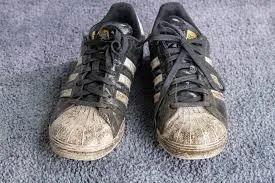What can happen if you let people wear their germy shoes in your house

Can your dirty shoes make you sick?
Image: Supplied
Lindsey Bever
The question: Is it true that your shoes can spread germs to the floors in your home and make you sick?
On any given day, you might trudge through a variety of stuff, including dirt and dog poop - and then walk into your home.
Your shoe soles can also pick up various microorganisms, including bacteria, and deposit them on the floors of your home, where your children and pets play.
That is one reason, aside from cultural and religious considerations, some people kick off their shoes at the door. But while gross, the germs on your shoes are unlikely to cause illness, some experts said.
In a small, widely cited study, researchers found that fecal bacteria such as E. coli, which can make you sick if they are ingested or make their way into a cut in your skin, were commonly present on the bottoms of shoes. And when those shoes came into contact with clean flooring, 90-99 percent of the bacteria were transferred to it. (The study was not peer reviewed and was funded by a shoe company marketing washable shoes.)
“The first three or four steps when you walk in the house are the most contaminated on the floor because you’re bringing all that stuff from outside and walking on the floors,” said Charles Gerba, a professor of microbiology at the University of Arizona and co-author of the study.
Other studies have reported that Clostridium difficile, a bacterium that can cause severe diarrhea, and methicillin-resistant Staphylococcus aureus (MRSA) can also be found on the bottoms of shoes.
“We live in a germy world,” and bacteria and viruses can be found on nearly any object, including our shoes, said William Schaffner, a professor of infectious diseases and preventive medicine at Vanderbilt University. But there aren’t any instances in the scientific literature of pathogens being transmitted from the soles of shoes to noses or mouths in high enough numbers to initiate infections, he said.
“That’s why we don't have public health recommendations that people sanitize their shoes,” he said.
Schaffner, who sometimes wears street shoes in his own home, said it is more notable that “our hands can pick up germs, and then we touch our mouths, noses and eyes. That's the mode of inoculation.”
Going shoeless at home has another benefit, some experts said.
When you wear shoes all the time, it may lead to deconditioning of the deeper muscles of the foot, said Amiethab Aiyer, an orthopedic surgeon specializing in foot and ankle conditions at Johns Hopkins. “Their relative strength and relative conditioning could lapse over time,” he said.
“From the perspective of maintaining strength and conditioning of the musculature in the feet, and to avoid the germ elements, it may be helpful to not wear shoes around the house,” he said.
From a cultural perspective, Aiyer, who is Indian American, said he and his family do not wear shoes in the house, both for cleanliness and out of respect for the home.
However, some people shouldn’t go barefoot at home. For example, if you have poor circulation or conditions such as neuropathy, which is nerve damage in the feet that can be caused by diabetes or chemotherapy, it can lead to the loss of protective sensation that may affect your ability to detect objects under foot, Aiyer said. Additionally, people who are at increased risk of falling may need traction or improved perceived balance that shoes can provide, he said.
What else you should know
The experts we spoke to said there’s no real reason for you to routinely clean the bottoms of your shoes. However, if you are concerned about dirt or germs, here are tips from experts:
- Hand-wash shoes with soap and warm water to remove dirt and debris, particularly from the soles of shoes. Mix water with a small amount of dish soap and a washing powder (sodium carbonate), and give the bottoms “a good thorough scrub with a strong bristle brush,” said Zachary Pozniak, co-owner of Jeeves New York, a dry cleaning and shoe cleaning and repair service. Insoles that are removable can be handwashed and air-dried before placing them back in the shoe.
- Disinfect the soles with a spray or wipe to help kill germs. Look for products registered with the Environmental Protection Agency to kill particular pathogens such as norovirus, a highly contagious germ that can cause severe gastrointestinal illness. For better control when using disinfectant sprays, spray a clean towel with the solution and wipe the soles of the shoes rather than spraying directly onto the shoe, Pozniak said.
- Machine wash shoes only when the manufacturer label states so. Before washing shoes in the machine, pretreat stains by hand in the sink, Pozniak said. Do not wash materials such as leather or suede.
- Air dry unless otherwise specified by the manufacturer. Clothes dryers can ruin shoes.
The bottom line: Our shoes can carry germs into the house, but they alone are unlikely to cause illness.